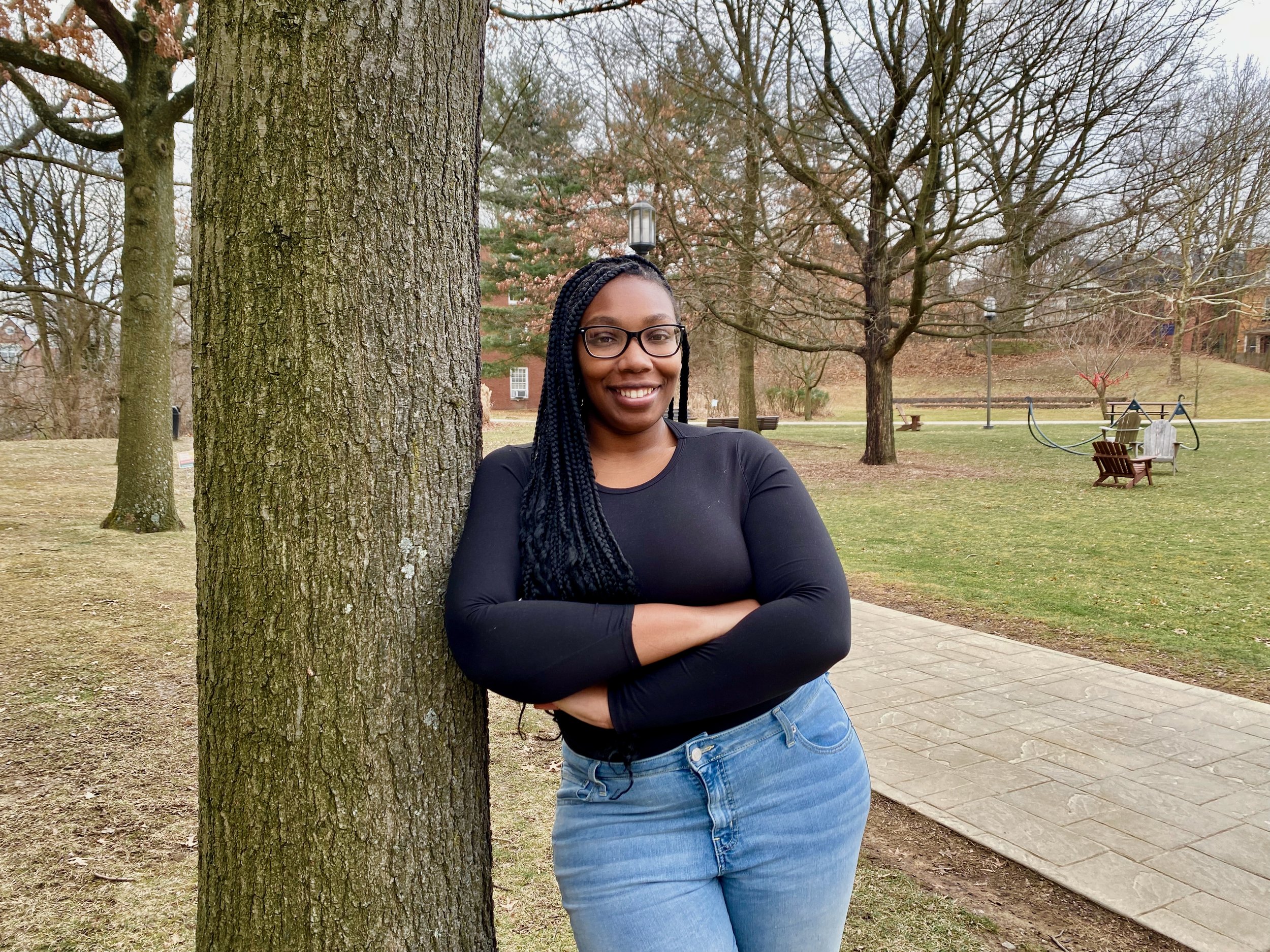Meet Toyaii Rutherford, Chatham’s JXS Project Coordinator
Toyaii Rutherford poses for a portrait outside Woodland Hall. (Mick Stinelli)
In November, Chatham University announced the receipt of a federal grant for the Counseling and Wellness Center aimed at preventing suicide and drug abuse through the Jed X Smith (JXS) Project.
Pulse@ChathamU sat down with Toyaii Rutherford, who was hired this year as coordinator of the JXS (pronounced “jacks”) Project, to talk about her path to working at Chatham and her plans to help students. These questions and responses have been edited for clarity and concision.
What were you doing before you came to Chatham?
I graduated from Clarion University, and I did an internship at New Outlook, a juvenile placement facility for females. So, while I was there, I was a drug and alcohol counselor.
I learned a lot there. It opened my eyes to things I didn’t know youth were struggling with at such a young age. I did my internship there, I got hired there, so I’d been there for about two-and-a-half years. I left because I had my first son, and I was working from 3 p.m. to 11 p.m. With a small child, it just didn’t fit my lifestyle.
Then I moved on to Propel Braddock Hills High School. I was a substitute teacher, and I also was an event coordinator there. Every day, I could be in any given room. If someone is on maternity leave, I’ll be there for the most part, but I was everywhere. I taught biology, I was in consumer science, I was a math teacher. I did a little bit of everything there, and I also planned all their major events: proms, homecomings, graduations. I facilitated parent-teacher conferences, open houses, stuff like that. Did a little bit of everything.
How do you describe your role at Chatham?
I am the JXS Project Coordinator. My role here is to help spread awareness of suicide and drug and overdose prevention on campus. I’ll do small events around that, as well as clerical work to make sure all of our requirements for the grant are being met.
I think this position, when I saw it, I was like, that ties into a lot of the things I’ve already been doing. I know a lot about drug and alcohol prevention just being a counselor, and suicide prevention— I don’t know as much about that, to be honest, but that is something I have been diving into and trying to pick up as much knowledge as possible. When I was working with the youth in high school and middle school, it just felt right to move on to higher education.
What’s the JXS Project?
The JXS project is grant-funded. That means the government gave us this money. When they gave us this money, they said, “These are the things you need to complete in order to honor this grant.” That’s where I come in. I have this timeline, and I have to make sure the things they want are executed, so that way, we are using their money properly.
Before I got here, [the University] submitted the healthy mindset survey. It’s a survey they asked Chatham students to complete just to figure out where their mental health was. From that data, it’s my job to plan events and provide support for the things that students need. We figured out their needs from that survey.
Were there any responses to the survey that stuck out to you?
The one that really hurt my heart was the fact that we found out 30% of students on Chatham’s campus have food insecurities. And I know everyone is like, oh, college is hard, everyone’s eating noodles, but no one should have to worry about where their next meal is coming from.
You can’t learn anything if your basic needs aren’t being met. You can go to classes, you can try to learn, but if your stomach’s growling, you’re not listening to what your professor is saying. The percentage of people who felt lonely on this campus didn’t make me feel good at all either.
What are some resources you’re pointing students toward if they’re having those problems?
Student Health Services has a food pantry that is available for students. It’s free, you can grab what you need. They just ask that you write your name down so they can keep track of who’s using it. You write your name down one time, then you can come down to grab things. That made me happy to see, like, alright, we see this problem. What are we going to do to try to fix that problem? That’s one.
We have Talk Campus, [a mental health resource app]. The Counseling Center, they have openings. They have counselors there who are able to talk to you and help you work through some things.
Recently, one thing we saw that students were interested in is having a sensory room. Now that’s my big plan for, hopefully, fall of 2024, to create that space for students if they’re just having a migraine and they need a space to calm down and ground themselves. It’s just a space they can sit and gather their thoughts and not have to worry about what’s going on around them.
Read more about the JXS Project, the University’s health and wellness resources, and see what else Chatham is doing to help students experiencing food insecurity.

